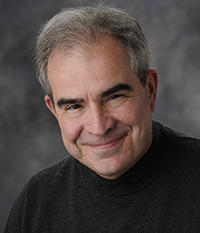When Ari Emanuel sat down to chat with Economic Club of Chicago chair and executive chair of Ulta Beauty Mary Dillon during an Economic Club event April 19, the conversation, understandably, focused on Emanuel’s many achievements, his all-star client list – which includes Dwayne Johnson, Larry David and Martin Scorsese – and his success as C.E.O. of Endeavor, the entertainment, and media agency that in 2016 was named one of Fortune’s “25 Most Important Private Companies.”
What was perhaps most fascinating, however, was Emanuel’s reflection on his childhood and how his brothers – Rahm and Zeke – and his parents made him who he is today.
Rahm is formerly White House Chief of Staff and Mayor of Chicago, and currently he’s Ambassador to Japan. Ezekiel was a professor at Harvard Medical School before becoming one of 16 members of President Biden’s Covid Advisory Board. No shortage of successes in that family.
Ari’s name was made not only in business but in media, where he inspired the character of super-agent Ari Gold (played by Chicago’s Jeremy Piven) in “Entourage.” So, it was more than a little surprising to hear him say he was “dominated by Zeke. Not that I’m a wallflower now,” Emanuel said, “but I became the wallflower in that relationship. It was very competitive, because we had three boys very close in age. In the education area, my brother Zeke was a lot higher than all the rest of us.”
About his family life, Emanuel recalled, “My parents were pretty strict about our education, but they were liberal about us keeping to a schedule: there were no requirements that we had to be here or there, which I think happens now with today’s parents. They permitted us to kind of just go out and discover, fail, and do whatever. We traveled by ourselves, and we hung out together when we went to Israel every summer. There were whole afternoons that we were just by ourselves having to kind of entertain ourselves. And that permitted us to grow and be curious, because you had to create your own entertainment, create your own lives.
“Also, my father worked exceedingly hard. And just by osmosis, you realize that hard work matters. And so, with that kind of combination, I think the three of us had a pretty good upbringing.”
Emanuel has often discussed how dyslexia just might be his super-power. “When you’re dyslexic at a very young age – and I have three boys who are dyslexic – you have to figure out different ways to learn. And you have to use people’s help in a different manner. If you look at the stats, with dyslexia, you’re either successful, or you get in a lot of trouble. When you’re dyslexic, and you’re a young kid, you’re embarrassed a lot, because people think you’re stupid. And it’s not that you’re stupid: you just can’t read because the circuits in your brain just don’t function the way other people’s do. You learn in a different manner. And if you can get past that, you’re not really scared of anything, because you’ve already gone through some pretty difficult times.
“You also learn skills, like how to use other people’s help to get through. So, when you get into a business, you use those same skills, and you realize that you can count on other people. You need to pick the right people to get you to where you need to be. It’s helped me in my business. I put great people around me.”
After Emanuel read about Michael Ovitz of Creative Artists Agency, he decided that he wanted to work for the public relations powerhouse. But he was still very young: “I was f**king around in Paris. I was gonna go to Northwestern business school, and I was trying to get in. My dad had studied in Lausanne, Switzerland. I said, ‘You know, Dad, I think I should take a little bit of time off,’ and my dad was incredible. He said, ‘Why don’t you just go to France, and I’ll support you, but when I tell you to come back, come back.’ It was fun.” [Emanuel smiled broadly at the recollection.]
According to Emanuel, none of the agencies “wanted to hire me because I was too old at the time: most people came in right after college. So, I just robo-called the head of HR at CAA 300 times – actually, a lot more than 300 times. And finally, they said, it was like Thursday, ‘if you could be out here on Monday. You have a job.’ And so, I flew out with my mom. I bought a car for $1,600. My dad gave me insurance for six months. I slept on a couch for eight months.”
Working for talent agencies, Emanuel had to learn how to process scripts, and with dyslexia, the challenges were obvious. He remembers in the early days, “You had to do ‘coverage’ every weekend. They would give you five scripts: you read the script and break it down, with characters, plot, what happened. Kind of like Cliff Notes. So, what I would do is I called the studio and figured out the reading departments, who has the coverage, and I’d pick up the coverage. I figured it out. I hacked it. So, I got through that. And then I went into the television department because scripts for television are short. Sitcoms were like 30 or 40 pages. I figured this baby out.”
Early childhood experiences with dyslexia taught Emanuel how to figure out a lot, not only about surviving and thriving with a reading disability, but about taking risks, pushing ahead and just hoping you’ll figure out a way to make it all work.
“I’m not really scared of taking risks,” says Emanuel. So, when I got an offer to stay at [major talent agency] ICM for a million dollars, I said to my father, ‘You know, I’m not going to take a salary. I think I’m gonna start my own company,’ He almost lost his mind.”
Emanuel seems to credit his dyslexia for helping make him the person he is today, and now he wants to help others, young people with reading problems, to overcome the challenges he himself understands so well.
“So, I’m going to start a school for dyslexic kids. For me, when I was growing up, I had my mother, right, and she was the best teacher. She helped me. She just wouldn’t let me fail. Okay, So, when I was crying, and I didn’t want to go to that tutor’s house and sit in the alcove and read for two hours because I just didn’t understand it, she just wasn’t going to let me not achieve the most I could achieve. I hated her at the time, and now I love her for it. My kids didn’t have a school for children with dyslexia, though they went to Lindamood-Bell [a private tutoring service] and they finished eighth grade at Park Century [a private school]. So, I’m going to start a first school in Los Angeles for inner city kids who don’t have the advantages my kids had. We’re going to make a difference.”
How to Help:
Dyslexia is just one of the many educational challenges facing children in the Chicago area and beyond. Consider supporting one of these impactful education-focused nonprofits making a difference in the lives of Chicago-area kids.
- Chicago Hopes For Kids provides direct academic support to children living in Chicago’s homeless shelters to help them overcome the educational challenges of homelessness.
- Daniel Murphy Scholarship Fund gives high school scholarship assistance and educational support to Chicago students from under-resourced neighborhoods.
- Horizons For Youth offers educational help and mentorship opportunities for more than 250 children at more than 50 Chicago-area elementary and high schools.
- Innovations For Learning believes learning to read is a basic civil right and it strives to build beginning reading skills globally through its programs.
- Sit Stay Read advances children’s literacy skills using an engaging curriculum, certified dogs, and dedicated volunteers.
More From Better:
- Better Makers: The People’s Music School Raises $500K to Give Underserved Kids Tuition-Free Musical Instruction
- You Said It: Time Is Now – Gain Clarity in Just 6 Seconds
- Let’s Talk Womxn Talks Change: Special Events for Women’s History Month

David Hammond is Dining and Drinking Editor at Newcity and contributes to the Chicago Tribune and other publications. In 2004, he co-founded LTHForum.com, the 15,000 member food chat site; for several years he wrote weekly “Food Detective” columns in the Chicago Sun-Times; he writes weekly food columns for Wednesday Journal. He has written extensively about the culinary traditions of Mexico and Southeast Asia and contributed several chapters to “Street Food Around the World.”
David is a supporter of S.A.C.R.E.D., Saving Agave for Culture, Recreation, Education and Development, an organization founded by Chicagoan Lou Bank and dedicated to increasing awareness of agave distillates and ensuring that the benefits of that awareness flow to the villages of Oaxaca, Mexico. Currently, S.A.C.R.E.D is funding the development of agave farms, a library and water preservation systems for the community of Santa Catarina Minas, Oaxaca.

